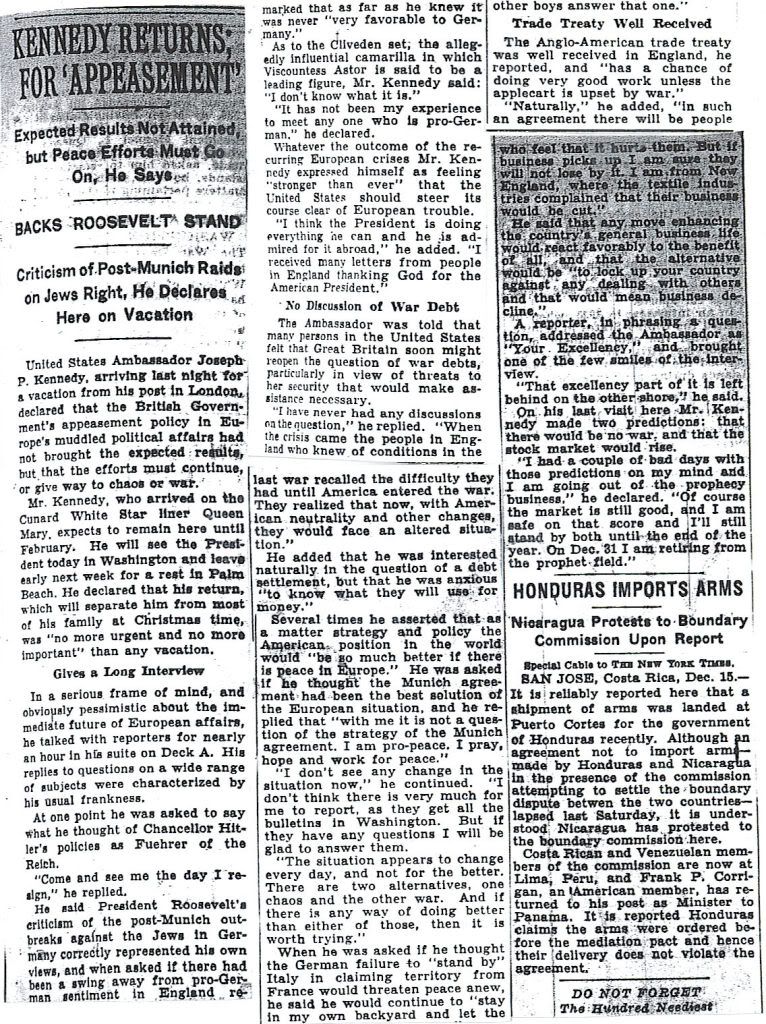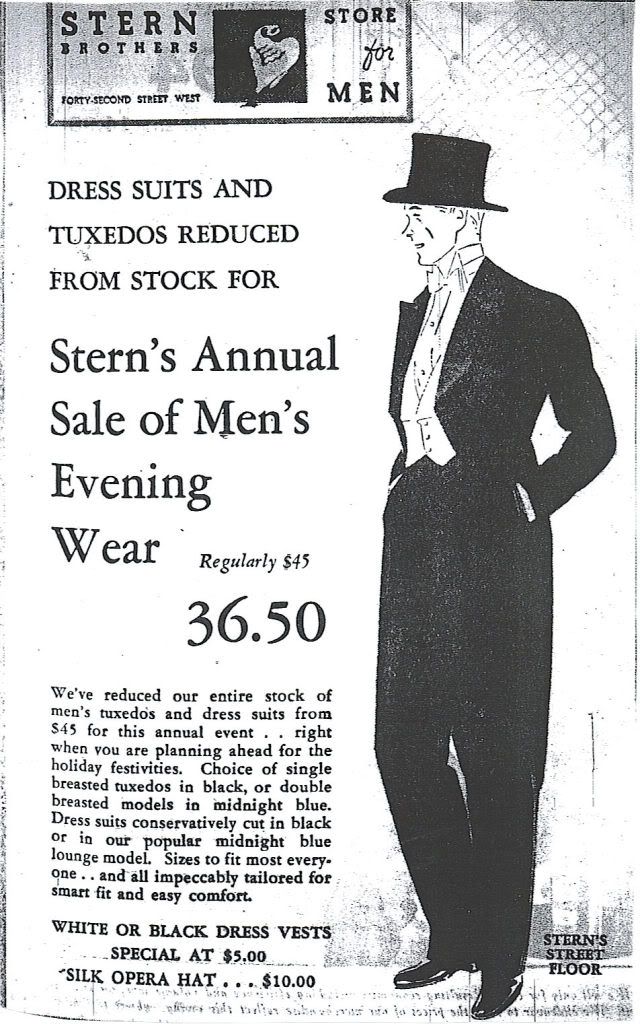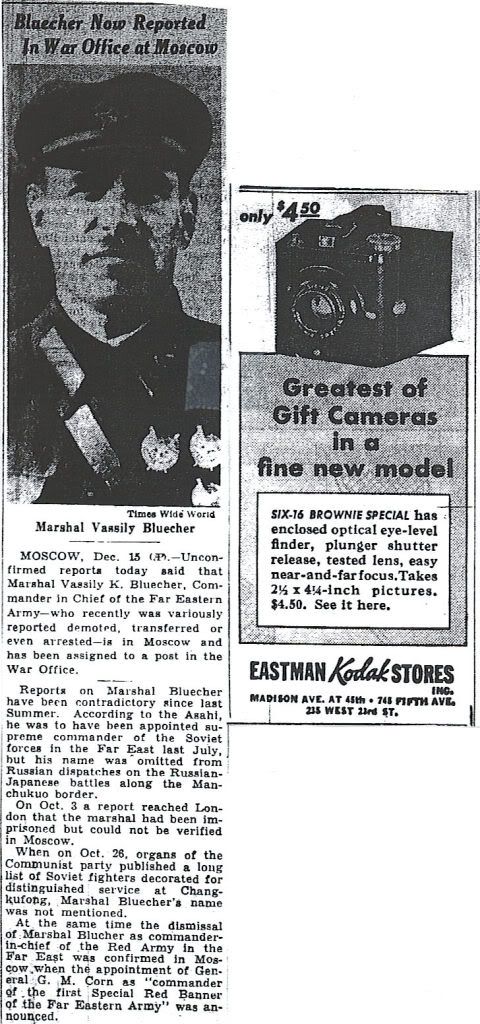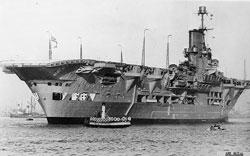
Posted on 12/16/2008 5:30:15 AM PST by Homer_J_Simpson



"Appeasement" is the flavor of the week at The Times. This makes at least two news items and an editorial that have highlighted the word since Sunday. Too bad Limbaugh wasn't around to do one of his montages.
Stern Brothers is having a sale on tuxedos for those of you who want to look extra sharp at Christmas and New Years. We end with a Marshal Bluecher update.
Damn $36.50 for a tux ? I gotta get me one.
So, between October and December, 1928, Bluecher was apparently demoted, transferred, arrested, imprisoned and then put in charge of the War Office.
Boy, that Stalin was a regular CHARACTER, wasn’t he?
The part about the War Office is just a rumor. Bluecher actually died on November 9, 1938, after three weeks of torture under the supervision of NKVD chief Lavrenty Beria.
*Insert sound of horse whinnying*
and they probably didn’t even ask him any questions...
Sometimes you have to make the tough decisions early. Applies to us also. But is NEVER easy, that is why adults should be in charge.
I found this article interesting too. Blucher (he has almost as many spellings as Kydafi) had already been dead for over a month when this article was published. I think the fact that he does not show up in any rolls, reports or battles should have turned a light on for whoever wrote this article. Typically when the Soviets “disappeared” someone you would just never hear about them again.
I have one of the Brownie cameras featured in the ad.
At this stage, old Joe was an appeaser, like Chamberlain, and got along very well with the Brits.
In due time, with appeasement having failed, and war erupted, Kennedy became a defeatist, a pacifist, anti-war, anti-semitic and most bitterly anti-Roosevelt.
Quoting from Perisco, "Roosevelt's Secret War":
Churchill's son, Randolf, remarked of the American ambassador's defeatism: "We had reached the point of bugging potential traitors and enemies. Joe Kennedy, the American ambassador, came under electronic surveillance."
Of course, that was in 1940, still a lifetime away from December of 1938...
Maybe the Times was not eager to see what went on behind the public face of the Soviet Union.
I agree, but would ask this: can you name one respect in which the NY Times' outlook differed from that of President Franklin Roosevelt? I can't.
What a good interview and a well written story. The thing I notice the most is that the writer of the article is really objective. He characterizes Kennedy views by actually printing what Kennedy says. It’s not like today where you get 5 paragraphs of writers opinion and 1 line from the figure in question.
Would you take $5 for it? It only cost $4.50 new.
I have a Kodak Crank and the bag it was carried in, what’s it worth?
It was definately a “foe to my foe is my friend” kind of atmosphere for sure.
I’m currently reading the book “The Forgotten 500” and even in it there is mention of the bias towards Tito in Yugoslavia because he was openly attacking the Nazi’s in that country (This impression was bolstered by James Klugman who is sometimes refered to as the unmentioned 6th member of the Camberage 5). Now I admit that this book reads almsot as if Churchill is somewhat pro-Communist which is absolutely not true. But what was true was that Chruchill was absolutely against the Nazis and even said that if Hell itself was against the Nazis then he would have to put in a good word for the Devil in the House of Commons.
On October 21, 1938, as we have seen, Hitler had directed the Wehrmacht to be ready to carry out that liquidation [of what remained of the Czechoslovak state]. On December 17, General Keitel issued what he called a “supplement to Directive of October 21”:
With reference to the “liquidation of the Rump Czech State,” the Fuehrer has given the following orders:
The operation is to be prepared on the assumption that no resistance worth mentioning is to be expected.
To the outside world it must clearly appear that it is merely a peaceful action and not a warlike undertaking.
The action must therefore be carried out by the peacetime armed forces only, without reinforcement by mobilization . . .
William L. Shirer, The Rise and Fall of the Third Reich, p. 438
HMS Ark Royal
Country United Kingdom
Ship Class Ark Royal-class Aircraft Carrier
Builder Cammell Laird and Company, Ltd., Birkenhead, England, Britain
Laid Down 16 September 1935
Launched 13 April 1937
Commissioned 16 December 1938
Sunk 14 November 1941
Displacement 22352 tons standard; 28143 tons full
Length 800 feet
Beam 95 feet
Draft 28 feet
Machinery 6 Admiralty 3-drum boilers, 3 Parsons geared turbines
Speed 31 knots
Range 7,600nm at 20 knots
Crew 1600
Armament 8x2.4.5in AA, 48x2-pdr 'pom-pom' AA, 8x4x12.7mm/0.50cal machine guns
Armor 4.5in belt, 3.5in deck over boiler rooms and magazines
Aircraft 60 to 72

Ark Royal was the first purpose-built fleet carrier built by the British. She was capable of carrying 60 to 72 aircraft, while still meeting the limits of the Washington Naval Treaty. Her distinctive feature of having side plating running up to the flight deck would become the symbol of future British carriers.
My working hypothesis is that, for all practical purposes, the NY Times was President Roosevelt's mouthpiece.
FDR sent Ambassador Kennedy to Britain when "appeasement" was popular, and so then was Kennedy.
But around this time in 1938, Roosevelt's (& others') views on appeasement began to change, while Kennedy's did not. That's why we see, as Homer points out, a very cagy interview.
For what it's worth -- I have several books on FDR or Churchill in which Kennedy is sometimes mentioned. And of them all, only one is truly respectful of Kennedy. Can you guess which one?
Yes, none other: Patrick Buchanan, "The Unnecessary War" puts a quote from Old Joe at the very core of Buchanan's argument:
page 298:
In March 1939, Chamberlain "guaranteed" Poland and several other European countries against a German invasion. Writes Buchanan:
Chamberlain had known all along his guarnatee was worthless. He had confided as much to Joe Kennedy, who wrote in his diary, "Chamberlain says the futility of it all is the thing that is frightful; after all they cannot save the Poles; they can merely carry on a war of revenge that will mean the destruction of the whole of Europe."
Disclaimer: Opinions posted on Free Republic are those of the individual posters and do not necessarily represent the opinion of Free Republic or its management. All materials posted herein are protected by copyright law and the exemption for fair use of copyrighted works.